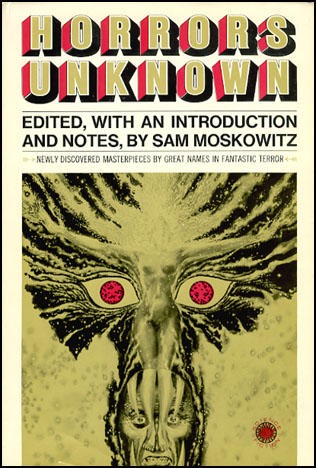caracabe reviewed Horrors Unknown by H.P. Lovecraft
A few gems in a handful of gravel
3 stars
This anthology describes itself as “newly discovered masterpieces by great names in fantastic terror,” but it’s mostly B-list work. I’m not sorry I read it, but that’s due to a couple of bright patches in the blah.
The opening story, “The Challenge from Beyond,” is a novelty, with parts written in turn by C. L. Moore, A. Merritt, H. P. Lovecraft, Robert E. Howard, and Frank Balknap Long, Jr. It’s not a seamless collaboration, but it is fun to read if you’re familiar with the works of those authors.
The final story, W. Fenimore’s “The Pool of the Stone God,” is more sketch than tale, and seems to be included because Fenimore might have been a pseudonym for A. Merritt.
Between those two, the real revelation for me is “From Hand to Mouth,” by Fitz-James O’Brien. I would call it a surrealist story, but it appeared decades before surrealism was …
This anthology describes itself as “newly discovered masterpieces by great names in fantastic terror,” but it’s mostly B-list work. I’m not sorry I read it, but that’s due to a couple of bright patches in the blah.
The opening story, “The Challenge from Beyond,” is a novelty, with parts written in turn by C. L. Moore, A. Merritt, H. P. Lovecraft, Robert E. Howard, and Frank Balknap Long, Jr. It’s not a seamless collaboration, but it is fun to read if you’re familiar with the works of those authors.
The final story, W. Fenimore’s “The Pool of the Stone God,” is more sketch than tale, and seems to be included because Fenimore might have been a pseudonym for A. Merritt.
Between those two, the real revelation for me is “From Hand to Mouth,” by Fitz-James O’Brien. I would call it a surrealist story, but it appeared decades before surrealism was invented. O’Brien never finished the piece, and his editor wrote the weak ending.
Two versions of an early Ray Bradbury story appear here: the version Bradbury self-published in his zine because no one would buy it, and a revised version co-written with Henry Hasse that Super Science Stories eventually bought. Neither is great, but it’s interesting to compare the two.

